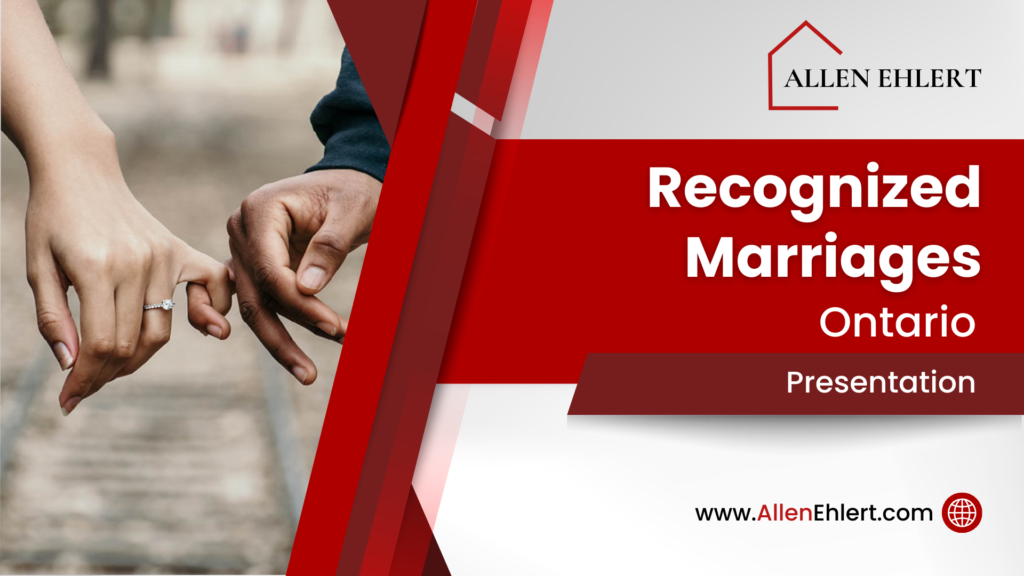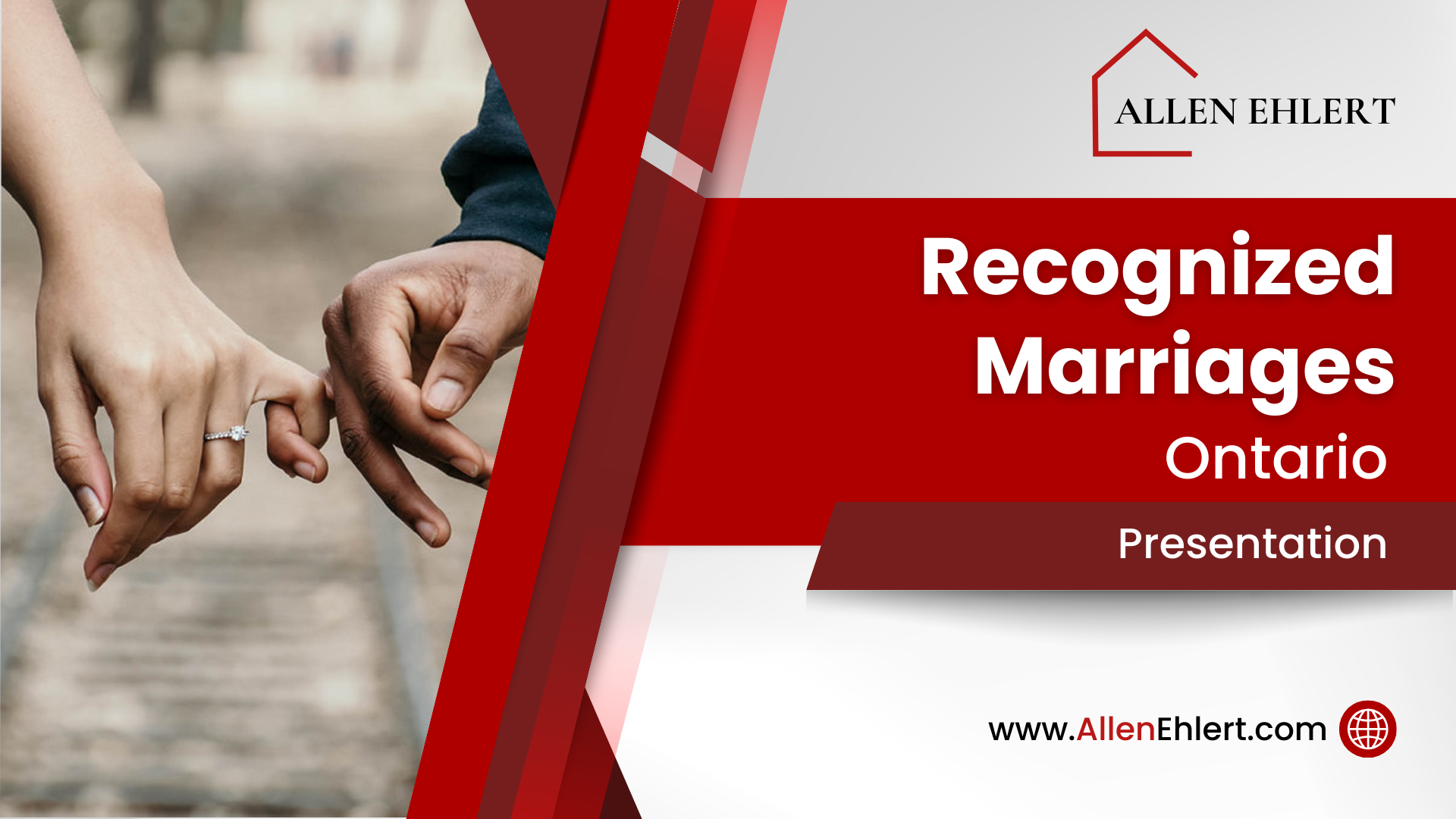In Ontario, Canada, in general, marriages that are legally recognized in the jurisdiction where they took place are typically considered valid in Ontario. For example, if you were married in the United States, and the marriage is legally recognized in the United States, it will generally be considered a legally recognized marriage in Ontario. However, the recognition of marriages performed outside of Ontario or in a different province can depend on various factors, including whether the marriage meets the legal requirements of Ontario law.
It’s also important to differentiate the term ‘spouse’ as there is a difference between common law spouse and married spouse. A married spouse and a common law spouse have different rights regarding the division of property, the matrimonial home, spousal support, and child support both in case of divorce and in case of the death of one of the spouses.
Consequently, when it comes to mortgages, it becomes critical to know what kind of spouse, if at all, Ontario recognizes a person to be.
Under the Family Law Act of Ontario, a marriage that is valid where it was performed is generally recognized as valid in Ontario. However, there may be exceptions or specific requirements, depending on the circumstances of the marriage.
It’s always a good idea to consult with a legal professional or seek advice from a family lawyer in Ontario to get specific guidance based on your situation. They can provide you with accurate information and guidance regarding the recognition of your marriage under Ontario’s Family Law Act.
Valid Marriage Requires for Ontario
In Ontario, for a marriage performed outside of Canada to be considered valid, it generally needs to meet certain legal requirements. These requirements may vary depending on the laws of the jurisdiction where the marriage took place and the laws of Ontario. However, some common criteria that marriages typically need to meet include:
Legal Capacity
Both parties must have the legal capacity to marry, meaning they are of legal age and mentally capable of understanding the nature and consequences of marriage.
Formalities
The marriage ceremony must comply with the legal formalities of the jurisdiction where it took place. This could include obtaining a marriage license, having the ceremony performed by an authorized officiant, and fulfilling any other legal requirements.
Recognition
The marriage must be recognized as legally valid in the jurisdiction where it was performed. This typically involves ensuring that the marriage is registered with the appropriate government authority in that jurisdiction.
Consent
Both parties must freely consent to the marriage without coercion or duress.
Prohibited Relationships
The marriage must not be prohibited by law due to a close familial relationship or other legal impediments.
It’s important to note that the specific requirements for recognizing marriages performed outside of Canada can vary depending on the circumstances, and there may be additional considerations depending on individual situations. Consulting with a legal professional or seeking advice from a family lawyer in Ontario can provide you with tailored guidance based on your particular circumstances.

Claims of Duress or Coercion
If a woman who immigrates to Canada claims duress regarding her marriage performed outside of Canada, Ontario would likely consider the validity of the marriage based on various factors, including the evidence presented to support her claim of duress.
In Ontario, as in many jurisdictions, marriages entered into under duress may be considered voidable. This means that while the marriage is initially considered valid, it can be legally annulled if certain conditions are met, such as proving that the consent to the marriage was obtained through coercion or duress.
If the woman can provide sufficient evidence to support her claim of duress, such as testimony, documentation, or witness statements, and if the circumstances meet the legal criteria for duress under Ontario law, the marriage may be considered voidable. In such cases, she may be able to seek an annulment of the marriage through the Ontario courts.
Married in Quebec
If you get married in Quebec, you typically do not need to register the marriage in Ontario if you are not planning to reside in Ontario permanently or if there are no other legal reasons to do so.
However, if you plan to move to Ontario or if there are specific legal requirements or benefits that necessitate the registration of your marriage in Ontario, it may be advisable to do so. For example, if you need to update your marital status for purposes such as immigration, taxation, or accessing spousal benefits, registering your marriage in Ontario could be necessary.
In general, marriages performed in Quebec are recognized as valid in Ontario, provided that the marriage was legally conducted according to Quebec’s laws. If you’re unsure about whether you need to register your marriage in Ontario or if you have specific legal concerns, consulting with a legal professional or a family lawyer in Ontario can provide you with personalized advice based on your situation.
See also: Marriage, Mortgage, Title, Death and Divorce
How to Register a Marriage in Ontario
In Ontario, registering a marriage typically involves submitting the necessary documentation to the Office of the Registrar General. Here’s a general overview of the process:
1. Obtain a Marriage Certificate
Before you can register your marriage, you need to have a marriage certificate. This document is usually issued by the officiant who performed the marriage ceremony.
2. Complete the Marriage Registration Form
You’ll need to complete a Marriage Registration Form. This form includes information about the couple getting married, the date and location of the marriage ceremony, and details about the officiant.
3. Submit the Form
Once the form is completed, it needs to be submitted to the Office of the Registrar General. This can typically be done online, by mail, or in person at a Service Ontario location.
4. Provide Supporting Documents
Along with the Marriage Registration Form, you may need to provide supporting documents, such as identification for both parties, the marriage certificate, and any other required documentation.
5. Pay the Fee
There may be a fee associated with registering a marriage in Ontario. The fee can vary depending on how you submit the registration and whether you request additional services, such as expedited processing.
6. Receive the Marriage Certificate
Once the marriage registration is processed, you’ll receive a Marriage Certificate from the Office of the Registrar General. This document serves as legal proof of your marriage and may be required for various purposes, such as changing your name or updating your marital status with government agencies.
It’s important to note that the specific requirements and procedures for registering a marriage in Ontario may vary, and it’s advisable to check with the Office of the Registrar General or consult with a legal professional for the most up-to-date information and guidance.
Common Law in Outside of Ontario
In Ontario, whether a couple is considered common-law depends on the laws of Ontario, not the laws of another jurisdiction where the couple might have lived previously.
According to the Ontario Family Law Act, a common-law relationship is defined as a relationship where two people live together in a conjugal relationship continuously for at least three years, or if they are in a relationship of some permanence and have a child together (either by birth or adoption).
So, if a couple meets the criteria for a common-law relationship as defined by Ontario law, they would be considered common-law partners in Ontario, regardless of whether they were considered common-law in a different jurisdiction. It’s important for couples to understand their legal rights and obligations under Ontario law if they are living in Ontario, regardless of their relationship status in other jurisdictions.
It’s important for individuals to seek legal advice from a family lawyer who can assess the specifics of their case and provide guidance on the best course of action. They can help navigate the legal process and advocate for their rights under Ontario law.










